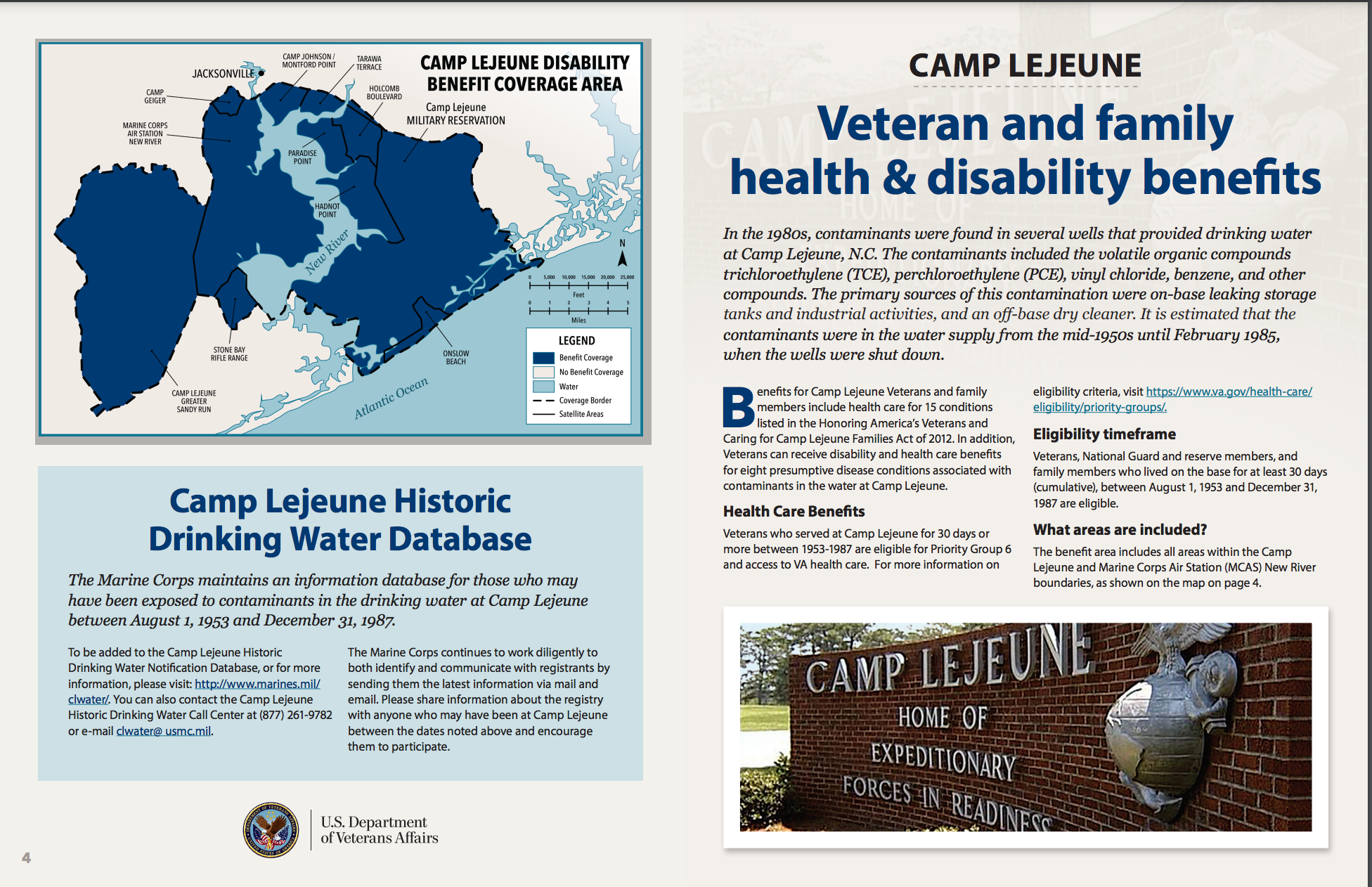Finally Justice is Coming for Camp Lejeune Water Contamination Victims
There may be a new path to justice for the nearly one million veterans and civilians potentially exposed to the contaminated water supply at Marine Corps Base Camp Lejeune in Jacksonville, North Carolina. Because of a North Carolina law that imposes a 10-year statute of repose for tort suits, veterans and family members who lived or worked on the Marine base and suffered diseases and deformities or lost loved ones have been prohibited from filing claims associated with toxic water exposure. Now, decades later, victims who have suffered side effects allegedly caused by contaminated water at Camp Lejeune may have a chance to recover compensation from the U.S. government for their injuries due to the Camp Lejeune Justice Act. If you or someone you love served or lived at Camp Lejeune between 1953 and 1987 and has since developed an illness linked to polluted well water, do not hesitate to speak to an experienced Camp Lejeune water contamination attorney. With the right legal advocate on your side, you may be able to recover monetary damages for the harm you have suffered by filing a Camp Lejeune lawsuit.
The Dangers of Contaminated Water at Camp Lejeune
Between 1953 and 1987, the drinking water at Camp Lejeune was contaminated with volatile organic compounds (VOCs) at levels up to several hundred times what the EPA considers safe.
Among the chemicals identified in the water at Camp Lejeune were trichloroethylene (TCE), vinyl chloride (VC), tetrachloroethylene, perchloroethylene (PCE), and benzene, known carcinogens that can cause serious adverse health effects in humans. Military servicemembers, their families, civilians, children, and others who lived or worked at the base over a period of more than 30 years may have been exposed to these poisonous VOCs through drinking the water, cooking, bathing, or cleaning, and may now be at risk for a number of serious health problems, including:
- Bladder cancer
- Kidney cancer
- Liver cancer
- Leukemia
- Aplastic anemia
- Cardiac defects
- Multiple myeloma
- Non-Hodgkin’s lymphoma
- Myelodysplastic syndrome
- Parkinson’s disease
- Systemic sclerosis
- Scleroderma
The water at Camp Lejeune was supplied by two on-base treatment plants: the Hadnot Point water treatment plant, which began operations in 1942, and the Tarawa Terrace water treatment plant, which began operations in 1952. The primary contaminant in the water supplied by the Hadnot Point plant was TCE, although other contaminants, like vinyl chloride, PCE, and benzene, were also found in the drinking water. These toxins reportedly came from several sources, including industrial spills, leaky underground storage tanks, and waste disposal sites. Water contamination affecting the Tarawa Terrace plant was traced back to an off-base dry cleaner called ABC One-Hour Cleaners. Perchloroethylene and tetrachloroethylene were released into the water supply as a result of the cleaner’s waste disposal practices.

What the Camp Lejeune Justice Act of 2022 Means for Victims
"Due to the carcinogenic nature of the contaminants in the water, nearly any type of cancer may be eligible to file an injury lawsuit against the government, and there will be no claims barred based on statute of limitation regardless of when the injury was diagnosed or even if the victim is still living."
What the Camp Lejeune Justice Act of 2022 Means for Victims
Marines and families harmed by exposure to toxic chemicals in the drinking water at Camp Lejeune have up until now been barred from pursuing the compensation they deserve, due to legal loopholes that have allowed the U.S. government to avoid liability. Fortunately, there is new hope for victims who have otherwise been unable to recover monetary damages for their adverse health outcomes. A new bill called the Camp Lejeune Justice Act of 2022, which is on its way to becoming federal law, would allow anyone who lived or worked at Camp Lejeune for at least 30 days between August 1, 1953, and December 31, 1987, and suffered an illness from exposure to contaminated water, to sue and recover damages from the U.S. government. The statute of repose in North Carolina, which imposes a deadline on legal claims after a certain amount of time has elapsed, would ordinarily expire after 10 years for this type of claim. However, this proposed legislation would give victims a two-year window, during which veterans, their families, and others can move forward with Camp Lejeune lawsuits against the government.
Don’t Wait to Act, Contact Us Today for Legal Help
If signed into law, the Camp Lejeune Justice Act of 2022 would finally give former residents of Camp Lejeune, veterans, and their families the right to take legal action against the government for exposure to contaminated water at the Marine base. In light of this potential new development, attorneys across the country are now reviewing Camp Lejeune water contamination claims on behalf of those who have developed cancer and other serious illnesses linked to trichloroethylene (TCE), vinyl chloride (VC), tetrachloroethylene, perchloroethylene (PCE), and benzene exposure. To learn more about filing a legal claim and seeking reparations from the U.S. government for exposure to tainted water at Camp Lejeune, contact us as soon as possible. We know how devastating cancer or any other serious health diagnosis can be, and we can assist you in pursuing the compensation you and your loved ones deserve.
Camp Lejeune Water Contamination Victims
Find out today if you qualify for compensation.
Find Out MoreConsumer Safety Watch offers safety advocate services and attorney referral services for patients throughout the United States including the states of Alabama, Alaska, Arizona, Arkansas, California, Colorado, Connecticut, Delaware, Florida, Georgia, Hawaii, Idaho, Illinois, Indiana, Iowa, Kansas, Kentucky, Louisiana, Maine, Maryland, Massachusetts, Michigan, Minnesota, Mississippi, Missouri, Montana, Nebraska, Nevada, New Hampshire, New Jersey, New Mexico, New York, North Carolina, North Dakota, Ohio, Oklahoma, Oregon, Pennsylvania, Rhode Island, South Carolina, South Dakota, Tennessee, Texas, Utah, Vermont, Virginia, Washington, West Virginia, Wisconsin and Wyoming.
Consumer Safety Watch offers consumer safety advocate services or can help you find an attorney throughout the United States including the following cities: Albuquerque, NM; Arlington, TX; Atlanta, GA; Austin, TX; Baltimore, MD; Boston, MA; Charlotte, NC; Chicago, IL; Cleveland, OH; Colorado Springs, CO; Columbus, OH; Dallas, TX; Denver, CO; Detroit, MI; Fresno, CA; Fort Worth, TX; Indianapolis, IN; Honolulu, HI; Houston, TX; Jacksonville, FL; Kansas City, KS; Kansas City, MO; Las Vegas, NV; Long Beach, CA; Los Angeles, CA; Louisville, KY; Memphis, TN; Mesa, AZ; Miami, FL; Miami, OH; Milwaukee, WI; Minneapolis, MN; Nashville, TN; New York City, NY; Oakland, CA; Oklahoma City, OK; Omaha, NE; Philadelphia, PA; Phoenix, AZ; Pittsburgh, PA; Portland, OR; Sacramento, CA; San Antonio, Tx; San Diego, CA; San Francisco, CA; San Jose, CA; Seattle, WA; St. Louis, MO; Tampa, FL; Tucson, AZ; Tulsa, Virginia Beach, VA; Washington, DC; Wichita, KS.
This website is not affiliated with any pharmaceutical or medical device company or any trademarked product. Results are not guaranteed. This website provides a free matching service and is not responsible for information or services from third party providers. Consumer Safety Watch is not a law firm. Every case is different and services available can vary.


